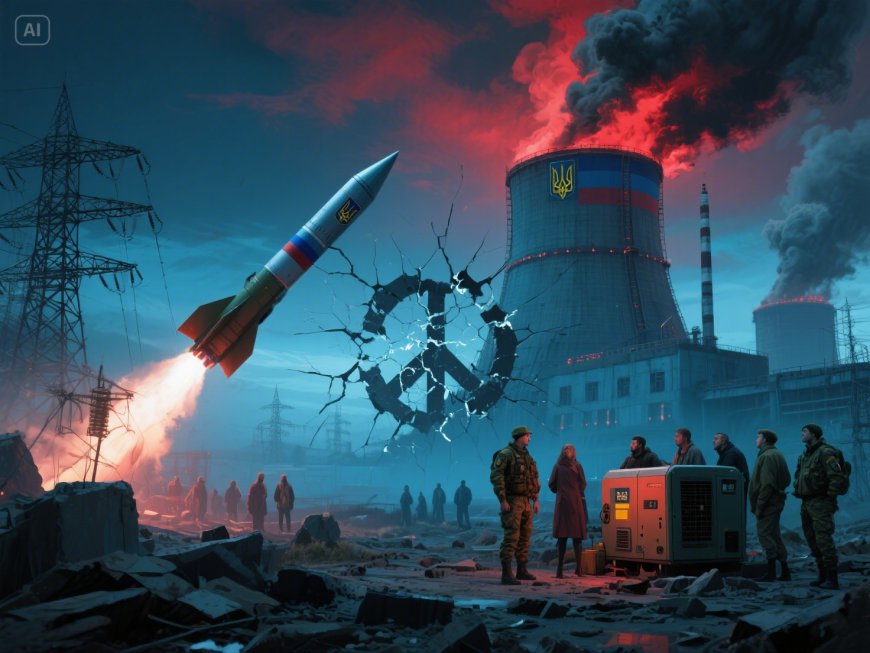Russia Ends Energy Truce with Ukraine Amid Rising Tensions
Russia officially ends the energy infrastructure truce with Ukraine. Discover the implications for the war, global diplomacy, and international energy markets.

In a dramatic turn of events, Russia has officially ended the 30-day moratorium on attacks targeting Ukraine's energy infrastructure. The Kremlin confirmed that there are no new directives from President Vladimir Putin to maintain the unofficial truce, effectively opening the door to a new phase of hostilities. The announcement has sent shockwaves through diplomatic circles, particularly as the United States, under Donald Trump's renewed leadership, is pushing to revive stalled peace negotiations between Moscow and Kyiv.
A Moratorium Without Rules
The energy truce, loosely held since March, was riddled with ambiguity. It lacked formal terms, monitoring mechanisms, or even a clear start date. According to reports, the ceasefire was first mentioned following a phone call between former U.S. President Donald Trump and Vladimir Putin. Ukraine later acknowledged the moratorium after consultations with U.S. officials. However, the lack of clarity around the agreement led to near-daily accusations of violations from both Russia and Ukraine.
While Russia claimed Ukraine was covertly sabotaging power infrastructure in occupied regions, Kyiv countered that Russia never truly ceased its drone and missile strikes on thermal plants and substations. Independent observers struggled to verify either side’s claims due to restricted access to the conflict zones.
Strategic Timing
The timing of the announcement is seen as highly strategic. With Trump's team attempting to broker a new round of negotiations between Russia and Ukraine, Moscow’s move complicates the diplomatic landscape. Some analysts suggest that by breaking the truce now, Russia is leveraging its military power to extract concessions or set new terms in any upcoming dialogue.
Others argue the Kremlin is signaling frustration with what it sees as a lack of progress or seriousness in Western diplomatic efforts. Trump’s outreach to Moscow, while welcomed by some factions in the U.S., has drawn criticism from NATO allies who view unilateral negotiations with Putin as a potential threat to alliance unity.
Fallout on the Ground
In Ukraine, the announcement has triggered immediate security alerts. Authorities are bracing for renewed attacks on power stations, substations, and fuel depots—facilities critical for both civilian life and military operations. The Ministry of Energy has already issued warnings to regional operators to reinforce protective measures and prepare for potential outages.
In cities like Kharkiv, Zaporizhzhia, and Odesa—previously targeted in energy-related strikes—residents have begun stocking up on fuel, generators, and essential supplies. Emergency services have increased patrols and contingency planning is underway for worst-case scenarios, including extended blackouts.
International Reactions
The international response has been swift. The European Union condemned the end of the truce, calling it a \"reckless escalation\" that puts millions of civilians at risk. NATO Secretary General Jens Stoltenberg urged Moscow to reconsider and warned of \"severe consequences\" if energy infrastructure is targeted again.
In Washington, the White House released a cautious statement urging both parties to avoid further escalation. However, some members of Congress have called for a re-evaluation of U.S. policy toward Russia, including renewed sanctions and increased military aid to Ukraine.
China, maintaining its neutral stance, urged restraint from both sides, emphasizing the need for dialogue. Meanwhile, Turkey and India have offered to host a new round of peace talks, though no official responses have been made.
Economic Implications
Beyond the battlefield, the collapse of the energy truce could have far-reaching economic impacts. Ukraine's energy sector is already operating under strain. Another wave of attacks could destabilize the grid further, disrupting both domestic industry and critical exports such as electricity to neighboring countries.
For Russia, resuming strikes on Ukrainian energy assets may invite harsher sanctions from the West. The move also risks damaging Moscow’s image in non-aligned nations that have so far refrained from taking sides.
Global energy markets are also on alert. While Ukraine is not a major energy exporter, its role as a transit country for natural gas and electricity means that renewed hostilities could add volatility to already unstable European energy prices.
What Comes Next?
With the moratorium officially lifted, all eyes are now on the battlefield and diplomatic backchannels. Will Russia resume its winter-style bombardments of Ukraine’s energy grid? Can Trump’s diplomatic push yield any results in such a tense environment?
What remains clear is that the end of the truce removes one of the few recent buffers against escalation. In a conflict marked by cycles of violence and stalled diplomacy, the return to energy warfare signals a deepening of the crisis with global consequences.
Conclusion: A Fragile Path to Peace
Russia's decision to end the energy truce with Ukraine adds a new layer of volatility to an already complex and deadly conflict. It threatens not only Ukraine’s critical infrastructure but also the prospects for meaningful peace negotiations in the near term.
As Ukraine braces for new waves of attacks and global leaders scramble to respond, the world faces a critical moment. Energy warfare is back on the table—and with it, the dangerous unpredictability of a war that refuses to end.
What's Your Reaction?
 Like
0
Like
0
 Dislike
0
Dislike
0
 Love
0
Love
0
 Funny
0
Funny
0
 Angry
0
Angry
0
 Sad
0
Sad
0
 Wow
0
Wow
0

































